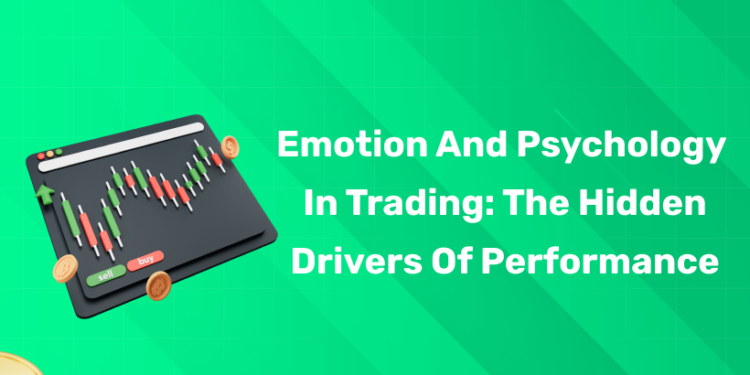Table of Contents
Having everything at one’s fingertips in today’s financial markets, access to trading tools has never been simpler; information is plentiful, and technology is instantaneous. Incredibly sophisticated platforms and complex tactics, many traders still face a persistent obstacle: their own minds, which cause them to make impulsive decisions that result in a variety of unfavorable instances.
Even with a solid strategy, rigorous backtests, and a well-defined risk framework, a trader may nevertheless have unreliable results. Seldom is a lack of adequate understanding of the issue. Outcomes are regularly influenced by the emotional and psychological reaction to risk, insecurity, and loss. When trading, emotions must be carefully weighed.
This blog addresses how emotions shape trading alternatives, the most prevalent psychological pitfalls, and doable strategies for developing a more solid and disciplined trading perspective.
Why Psychology Matters More Than Perfect Strategy
In principle, trading is a logical activity that involves weighing odds, evaluating risk and reward, and acting appropriately. It is anything but in practice; actual money goes into play in actual exchanges, and money has an intense psychological element.
When a position shifts against our viewpoint, it undermines not only our analysis but also our self-esteem, our sense of control, and occasionally even our sense of value. Moreover, traders sometimes abandon their meticulously planned strategies in the midst of a volatile situation.
With time, it becomes evident that, within distinct individuals, a similar method can yield drastically different outcomes. Emotional discipline, rather than a “secret indicator,” is what divides competent traders from inconsistent ones. Risk management pertains to ensuring we can truly comply to the guidelines we set, not just concerning metrics. A trader who is aware of their own psychological inclinations has a real, long-term edge over others.
The Emotional Cycle of a Trade
1: What is a stock?
Every trade typically follows an enduring emotional curve: analysis and anticipation precede the entry. We evaluate the setup, review our guidelines, and clarify our stance. Uncertainty rises after admission. Every price tick feels personalized if money is at stake. Enthusiasm and reliance boost to the point of overconfidence—if the trade goes in our favor. Decisions start to be influenced by doubt, fear, and denial if the trade turns against us.
A person is not “weak” because of any of this; more accurately, it renders them human. The difficulty lies in keeping emotion from driving risk decisions rather than trying to eradicate it, which is neither desirable nor feasible.
Common Psychological Pitfalls Traders Face
1. Fear of Missing Out (FOMO)
Perhaps the most pricey emotion available is FOMO. An overwhelming urge to “jump in before it’s too late” may be sparked by an important shift in an index or stock. The trader tends to consider, “What if I miss this rally?” rather than, “Is this a good entry?”
Trades motivated by FOMO typically have:
- Minimal entry levels
- Risk-reward compression
- Minimal or nonexistent compliance to the primary trading strategy
- FOMO gradually erodes confidence and resources.
2. Loss Aversion and Holding Losing Positions
Based on behavioral economics studies, losses inflict more psychological harm than equivalent gains. This frequently correlates into the following in trading:
- Cutting trades that are lucrative prematurely in a bid to “lock in” profits
- Keeping losing transactions open for too long to prevent incurring a loss
- Small earnings and large drawdowns result in a lopsided distribution. By using disciplined exit rules and predetermined stop-loss thresholds, a professional strategy reverses this pattern.
3. Revenge Trading After a Loss
A big loss might feel like a personal assault. Therefore, the temptation is to “win it back” as soon as possible. Increased stock size, loosening criteria, and a trade spurred more by emotion than by logic are all possible. A plausible loss is frequently turned into a severe slump by revenge trading. It is not a tactic, but a response. Long-term survival is contingent upon early detection of this impulse.
4. Overconfidence After a Winning Streak
It’s interesting to note that success can be equally hazardous as failure. One may feel invincible after a string of profitable trades. Traders may:
- Grow larger than their normal risk tolerance
- Ignore cues that go against their beliefs.
- Make transactions outside of their primary approach.
- Overconfidence has a way of being humbled by markets. Those traders who maintain their composure in both good and bad times are the ones who survive.
Learn Stock Marketing with a Share Trading Expert! Explore Here!
Building Emotional Discipline: Practical Approaches
1. Start With a Clear, Written Trading Plan
A trading strategy should be more than just a recollection. It becomes a standard you can hold yourself to when you put it in writing. A good strategy will specify:
- Markets and trading instruments
- Criteria for entry and departure
- Risk per trade and position size
- Maximum restrictions on daily or weekly losses
This document serves as a stabilizing point of reference during emotionally charged occasions. “What does my plan tell me to do?” is a better question to ask than “What do I feel like doing?”
2. Use Position Sizing That Matches Your Psychology
Position sizing isn’t just about numbers; it’s about emotional stability. Every trader has a different tolerance for risk, fear, and uncertainty. When your position size is too large, even a normal market fluctuation can trigger panic, leading to premature exits or revenge trading. On the other hand, using a size that aligns with your psychological comfort keeps you calm, focused, and consistent.
Proper position sizing helps you follow your strategy without emotional interference, reduces stress, and protects your capital. Start small, increase gradually, and ensure every trade feels manageable. Trading success grows when your mindset and risk size stay in harmony.
3. Implement Rules for “Emotional High-Risk” Situations
Risk management is a psychological process as well as a mathematical measure. Your ability to make decisions will deteriorate if a position is so big that you struggle to fall asleep peacefully or if you feel like you have to keep an eye on everything.
Smaller, consistent position sizes, according to many skilled traders, result in:
- More lucid thinking
- Reduced emotional instability
- More reliable performance
The objective is to reduce risk to a level where you can reason logically, not to completely remove it.
Poor judgments are consistently triggered by certain conditions:
- Following a major setback
- Following an exceptionally high gain
If you are not an expert at trading highly volatile news events,You may guard against your own desires by making a commitment to guidelines like “no fresh investments immediately after hitting my daily loss limit” or “no size increase after three consecutive wins.”
4. Keep a Trading Journal-Including Emotions
A journal is used for more than just P&L and prices. You can identify trends like:
- “I tend to enter early when I feel impatient” by documenting your feelings both during and after trades.
- “My worst trades occur when I’m trying to make up for a previous loss.”
- “When I am at ease and not preoccupied with money, I make the best decisions.”
These insights enable you to gradually make minor but substantial behavioral modifications that add up to improved performance.
From Reactive to Professional: A Mindset Shift
Switching from a reactive to a professional standpoint is ultimately the key to grasping trading psychology. “How do I feel about this position right now?” seeks a reactive trader. “Does this decision align with my process, my risk limits, and my long-term goals?” says a skilled trader. Critical changes in outlook include:
- Transitioning from process-focused to outcome-focused: Your ability is not determined by a single trade. Whether your choices were in line with a sound methodology is what counts.
- Switching from a reactive to a professional standpoint: It is ultimately the key to grasping trading psychology. “How do I feel about this position right now?” seeks a reactive trader. “Does this decision align with my process, my risk limits, and my long-term goals?” says a skilled trader.
- Fundamental changes in outlook include: Switching from process-focused to outcome-focused: Your ability cannot be assessed by a single trade. Whether your choices were in line with a sound methodology is what counts.
Learn Stock Marketing with a Share Trading Expert! Explore Here!
Stock Market Training Reviewed & Monitored by SEBI Registered RA
Trusted, concepts to help you grow with confidence. Enroll now and learn to start investing the right way.
Know moreConclusion
Trading will always require psychology and emotion. While these things are immutable, they can be comprehended, controlled, and even used to one’s advantage. Long-term successful traders are not those who never experience fear or greed, but rather those who create routines and practices that keep these feelings from influencing their choices.
As a trading company, we prioritize discipline and mindset in addition to strategy and technology. In our viewpoint, building emotional resilience is a prerequisite for sustainable success rather than only being a “soft skill.” Markets will ultimately always be unpredictable. The way you react is what gives you an actual edge.
Stock Market Training Reviewed & Monitored by SEBI Registered RA
Trusted, concepts to help you grow with confidence. Enroll now and learn to start investing the right way.
Know moreFrequently Asked Questions
What is trading psychology?
Trading psychology refers to the emotional and mental state that influences trading decisions, including discipline, patience, fear, and confidence.
Why are emotions important in trading?
Emotions drive most trading errors. Fear, greed, overconfidence, and hesitation can push traders to break rules or exit trades too early.
How does fear affect trading performance?
Fear makes traders avoid good setups, doubt their analysis, or close trades prematurely, reducing profitability and confidence.
What role does discipline play in trading psychology?
Discipline helps traders follow their strategy, control emotions, manage risk, and avoid impulsive decisions.














